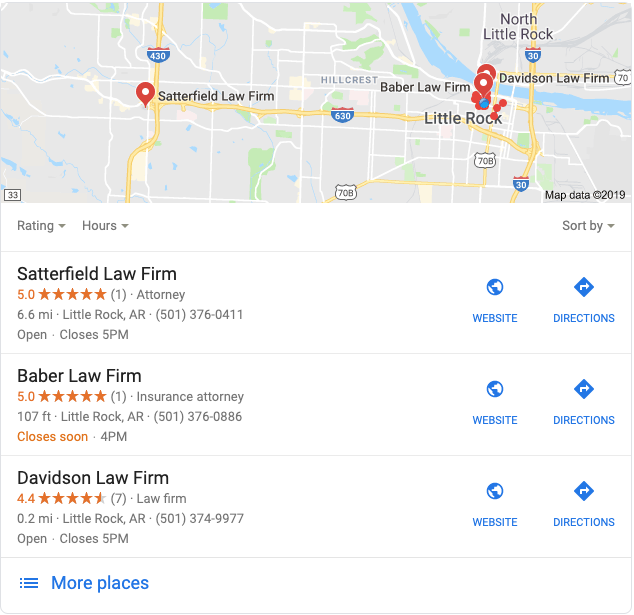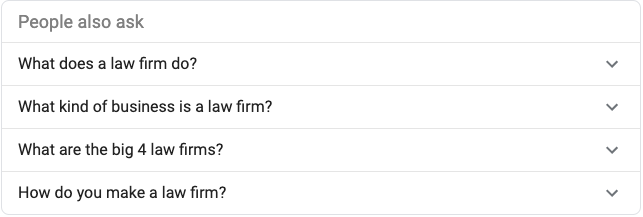Search engine optimization (SEO) is an essential part of your law firm’s digital presence: it helps potential customers find you online, making it simple for leads to reach out.
But what if you’re missing out on the power of local SEO?
What is Local SEO?
You see evidence of local SEO every time you make a Google search for a restaurant, service, or other similar query:

This box, called the local pack, shows up above the rest of the organic (unpaid) search results. It’s complete with a handy map, ratings, hours, and more.
So why do these three businesses get to show up in the local pack? It’s not simply based on location and ratings (though those definitely help): they’ve taken the time to optimize their local SEO.
Why Local SEO Matters
The Power of the Local Pack
Google’s local pack is an incredible place for your law firm to show up: it lets potential clients know at a glance where you are, how you’re rated, and how to contact you.
However, organic SEO—the general, unpaid SEO work you’ve done to help people find your law firm online—doesn’t necessarily help you show up as one of the top three locations in that coveted spot.
“Because local business searches often are based on geographic factors, organic SEO isn’t enough to rank [in the local pack], especially if your competitors are engaging in local SEO,” explains Betsy McLeod of digital marketing agency Blue Corona. “Local SEO increases visibility for businesses interested in ranking for geographically-related searches.”
How Intent Affects Searches
When people search for “law firm” with no location tools enabled and no further keywords indicating a city or area, Google isn’t positive about what they want to see. Are they looking for…
- …law firms near them?
- …the biggest law firms around?
- …news about law firms?
- …the definition of a law firm?
You can see evidence of Google’s uncertainty in the “People also ask” section of the search results, which is their way of offering up solutions to vague searches:

But when people search with a local intent—i.e., “Little Rock Law firm”—it’s much more likely that they’re actively looking for a lawyer to talk to (and, ideally, hire).
Showing up in a search for “law firm” is okay. But showing up in a search for “law firm in your city is much more valuable to you. Here’s why: the person searching for a law firm in your area is further down the sales funnel than the person idly Googling “law firm”—in other words, they’re one step closer to becoming a client.
5 Ways to Improve Your Local SEO—for Free
Ready to start boosting your law firm’s performance in the local pack? Here are the top five ways to improve your law firm’s local SEO ranking—without spending a dime:
1. Complete Your Google My Business Account
If your Google My Business account isn’t filled out with accurate information, Google isn’t going to trust your law firm enough to show it in the local pack. Your name, address and phone number must be on your Google My Business account if you want it to perform well in local searches.
That’s not all, though: for optimal results, you have to ensure that that information is exactly the same in every place it shows up on the web.
For example, make sure that your address is consistent. It’s not doing you any favors to list your street as “West Second Street” on your website and “W 2nd St.” somewhere else. Humans know this means the same place, but Google—which has to find the best, most trustworthy results in about half a second—will likely pass it over because it thinks you’re offering conflicting information.
2. Claim Your Online Listings
To help make sure your information is consistent across the board, claim and verify all online directory listings of your law firm. Look up your firm on local listings sites like Yelp, YP.com, and Foursquare—as well as law directories such as Lawyers.com, Avvo, and Justia—and claim the listings (or, if needed, create them!).
Providing your information in a variety of different places builds your firm’s authority online, which in turn makes Google much more confident about suggesting you as an answer to its users’ law-related queries.
3. Add Local Information to Your Website
While you don’t want to overload your website’s copy with keywords about which counties you serve, it’s not a bad idea to mention your location occasionally. Doing so can help make Google feel that much more safe about suggesting your firm to someone searching in those areas.
“Some local business owners omit geographic terms that describe their physical location or service area because they believe that search engines can figure this out on their own,” writes Moz, an SEO company, in the On-Page SEO section of their Beginner’s Guide to SEO.
“On the contrary, it’s vital that local business websites’ content, URLs, and other on-site assets make specific mention of city names, neighborhood names, and other regional descriptors. Let both consumers and search engines know exactly where you are and where you serve, rather than relying on your physical location alone.”
Not sure where to mention your location without it sounding forced and clunky? If you haven’t already, add a blog to your website. A blog is a great place to write about local events your firm participates in and to share press releases and news stories that mention you.
4. Cultivate Backlinks & Citations
News stories and press releases aren’t just helpful for bolstering your blog: articles about you that are published by various platforms across the web are great for backlinking purposes and for improving local SEO.
“Building linked unstructured citations—references to a business’ contact information on a non-directory platform, like a blog or a news site—is important for moving the ranking needle for local SEO,” Moz explains. “It’s also a great way to earn valuable links when you’re marketing a local business.”
Not only do citations provide exposure and SEO value, but they build your credibility, too—meaning Google is more likely to feel confident about recommending your law firm to its users.
5. Perfect Your Facebook Page
A robust social media presence helps boost your authority with both organic and local SEO. “Facebook is considered a local SEO signal, meaning search engines look at your business’ Facebook profile as an indicator when they spit out local search results,” says McLeod.
Many law firms don’t take the time to manage their Facebook pages because they don’t believe it’s valuable to do so. They’re wrong: keeping your Facebook page up to date is one of the easiest ways for you to let Google (and clients!) know that your law firm is active, relevant, and helpful.
Improve Your Law Firm’s SEO Performance
Want to learn more about how to boost your business’s SEO rating and online presence? Contact Kirkpatrick Creative today for a customized search engine optimization plan, social media management package, and much, much more.

